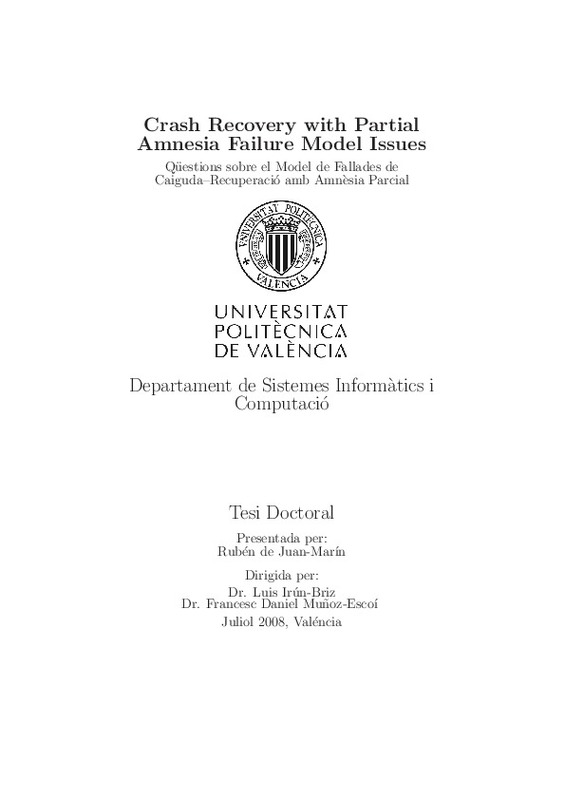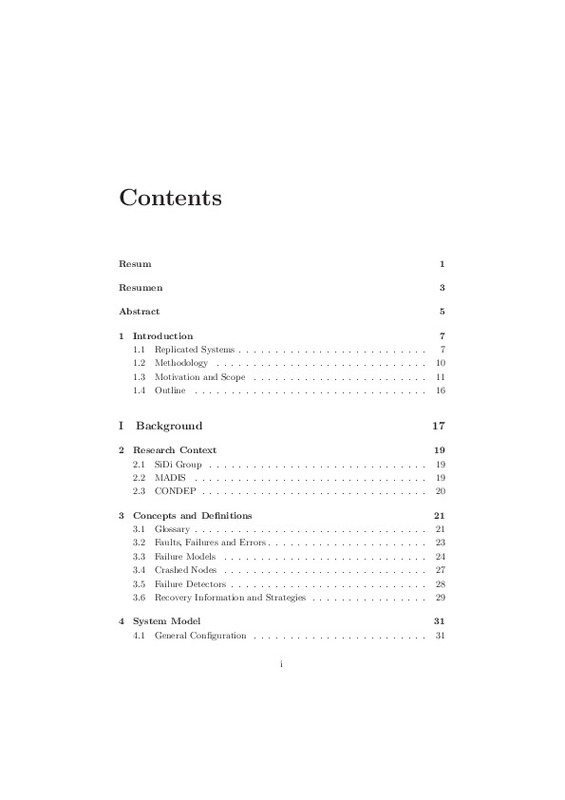- RiuNet repositorio UPV
- :
- Investigación
- :
- Tesis doctorales
- :
- Ver ítem
JavaScript is disabled for your browser. Some features of this site may not work without it.
Buscar en RiuNet
Listar
Mi cuenta
Estadísticas
Ayuda RiuNet
Admin. UPV
Crash recovery with partial amnesia failure model issues
Mostrar el registro sencillo del ítem
Ficheros en el ítem
| dc.contributor.advisor | Irún Briz, Luis
|
es_ES |
| dc.contributor.advisor | Muñoz Escoí, Francisco Daniel
|
es_ES |
| dc.contributor.author | De Juan Marín, Rubén
|
es_ES |
| dc.date.accessioned | 2008-09-30T06:55:44Z | |
| dc.date.available | 2008-09-30T06:55:44Z | |
| dc.date.created | 2008-09-08T08:00:00Z | es_ES |
| dc.date.issued | 2008-09-30T06:55:34Z | es_ES |
| dc.identifier.uri | http://hdl.handle.net/10251/3302 | |
| dc.description.abstract | Replicated systems are a kind of distributed systems whose main goal is to ensure that computer systems are highly available, fault tolerant and provide high performance. One of the last trends in replication techniques managed by replication protocols, make use of Group Communication Sys- tem, and more specifically of the communication primitive atomic broadcast for developing more eficient replication protocols. An important aspect in these systems consists in how they manage the disconnection of nodes {which degrades their service{ and the connec- tion/reconnection of nodes for maintaining their original support. This task is delegated in replicated systems to recovery protocols. How it works de- pends specially on the failure model adopted. A model commonly used for systems managing large state is the crash-recovery with partial amnesia be- cause it implies short recovery periods. But, assuming it implies arising several problems. Most of them have been already solved in the literature: view management, abort of local transactions started in crashed nodes { when referring to transactional environments{ or for example the reinclu- sion of new nodes to the replicated system. Anyway, there is one problem related to the assumption of this second failure model that has not been completely considered: the amnesia phenomenon. Phenomenon that can lead to inconsistencies if it is not correctly managed. This work presents this inconsistency problem due to the amnesia and formalizes it, de ning the properties that must be ful lled for avoiding it and de ning possible solutions. Besides, it also presents and formalizes an inconsistency problem {due to the amnesia{ which appears under a speci c sequence of events allowed by the majority partition progress condition that will imply to stop the system, proposing the properties for overcoming it and proposing di erent solutions. As a consequence it proposes a new majority partition progress condition. In the sequel there is de | es_ES |
| dc.language | Español | es_ES |
| dc.publisher | Universitat Politècnica de València | es_ES |
| dc.rights | Reserva de todos los derechos | es_ES |
| dc.source | Riunet | |
| dc.subject | Replicated systems | es_ES |
| dc.subject | High availability | es_ES |
| dc.subject | Fault tolerance | es_ES |
| dc.subject | Recovery protocol | es_ES |
| dc.subject | Crash recovery with partial amnesia | es_ES |
| dc.subject | Amnesia recovery | es_ES |
| dc.subject | Failure model | es_ES |
| dc.subject | Replicated databases | es_ES |
| dc.subject | Replication protocols | es_ES |
| dc.subject.classification | LENGUAJES Y SISTEMAS INFORMATICOS | es_ES |
| dc.title | Crash recovery with partial amnesia failure model issues | |
| dc.type | Tesis doctoral | es_ES |
| dc.subject.unesco | 12 - Matemáticas | es_ES |
| dc.subject.unesco | 120317 - Informática | es_ES |
| dc.subject.unesco | 1203 - Ciencia de los ordenadores | es_ES |
| dc.identifier.doi | 10.4995/Thesis/10251/3302 | es_ES |
| dc.rights.accessRights | Abierto | es_ES |
| dc.contributor.affiliation | Universitat Politècnica de València. Departamento de Sistemas Informáticos y Computación - Departament de Sistemes Informàtics i Computació | es_ES |
| dc.description.bibliographicCitation | De Juan Marín, R. (2008). Crash recovery with partial amnesia failure model issues [Tesis doctoral]. Universitat Politècnica de València. https://doi.org/10.4995/Thesis/10251/3302 | es_ES |
| dc.description.accrualMethod | Palancia | es_ES |
| dc.type.version | info:eu-repo/semantics/acceptedVersion | es_ES |
| dc.relation.tesis | 2887 | es_ES |
Este ítem aparece en la(s) siguiente(s) colección(ones)
-
Tesis doctorales [5389]







![Text file [Text]](/themes/UPV/images/text.png)


